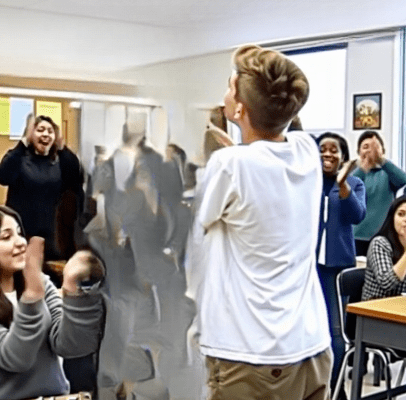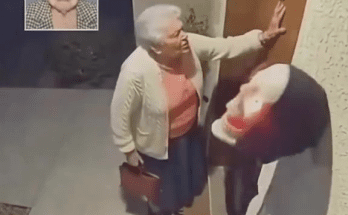There are moments in life that test not only our patience but also our character. Sometimes, these moments appear in the most ordinary settings — places filled with routine, laughter, and the quiet rhythm of everyday life. For Mrs. Angela Johnson, a respected educator, one ordinary Tuesday morning would become a powerful reminder of what true strength, dignity, and forgiveness look like in action.
A Morning Like Any Other
The day began just like countless others at Lincoln High School. Sunlight streamed through the tall classroom windows, falling across rows of desks and colorful posters that reflected both learning and hope. Quotes from historical leaders adorned the walls — reminders of courage, unity, and progress.
Mrs. Johnson, a calm and steady figure in her mid-forties, moved with quiet confidence as she prepared her lesson on civil rights and equality. Her teaching style wasn’t just about facts; it was about the meaning behind them. She often reminded her students that history is not just about dates and events — it’s about the choices people made when faced with challenges.
Her students admired her poise and her passion, though not everyone understood her right away. A few struggled with the lessons that challenged them to think deeply about fairness, empathy, and respect. And on this particular day, that struggle would reveal itself in unexpected ways.
A Quiet Test of Character
In the back of the room sat three students — bright but restless — who had lately become more distracted during class discussions. Their names were Ryan, Jake, and Mike. They often joked among themselves, testing boundaries in ways that reflected youthful immaturity more than malice. But over time, their remarks had become careless and thoughtless, veering into areas that revealed ignorance more than intent.
Mrs. Johnson, with her composed and patient nature, never reacted with anger. She believed that discipline was best taught through example. Her calmness came not from passivity, but from a deep well of inner strength — the kind she had earned long before becoming a teacher.
Before she ever stood at a chalkboard, Mrs. Johnson had served for more than a decade in the U.S. Navy, where she learned discipline, leadership, and endurance. She had faced challenges few others could imagine, and each one shaped her into the strong yet compassionate woman she became.
That day, however, would test her in a way no training manual could prepare her for.
A Moment That Would Define the Lesson
The class had just begun a discussion about equality — how it has evolved, and how it remains a continuing effort. As students shared their thoughts, Ryan, often eager to stand out, made a comment under his breath. Several students nearby heard it, and their uneasy expressions told Mrs. Johnson that something inappropriate had been said.
She turned toward the back of the room, her voice calm but firm. “Ryan, would you like to share your comment with everyone?”
Ryan shrugged, avoiding eye contact. “Just saying maybe people should stop bringing up race all the time,” he muttered.
The room grew quiet. His words hung in the air, not shouted, but heavy enough to make others shift uncomfortably in their seats. Mrs. Johnson didn’t scold him. Instead, she met the moment as she always did — with grace.
“That’s an interesting point,” she said evenly. “But history isn’t about placing blame — it’s about understanding truth. If we stop talking about the past, we lose the lessons that make us better.”
Ryan looked away, pretending indifference, though his defensiveness showed. Mrs. Johnson turned back to the board, continuing the discussion, but the atmosphere had changed. Something unspoken was now present in the room — tension that came from misunderstanding, fear, and pride.
The Breaking Point
Moments later, Ryan’s frustration boiled over. He stood abruptly, his chair scraping against the floor. “You think you’re better than everyone else because you were in the Navy,” he said, his tone sharp and impulsive.
The entire room froze.
Mrs. Johnson turned toward him, her expression calm but serious. “Sit down, Ryan,” she said gently.
But in that moment of anger and confusion, Ryan stepped forward, crossing a line he would later regret. His behavior was not one of true malice but of immaturity and emotion. The students gasped, unsure how to react.
And yet, through it all, Mrs. Johnson never lost control — not for a second.
She met his eyes steadily and said, in a low but firm voice, “Let go, Ryan.”
Her voice carried authority — not from anger, but from experience. The room went still. Slowly, Ryan realized the weight of what he had done. His expression shifted from defiance to regret.
Mrs. Johnson, showing the same self-discipline that had carried her through years of service, simply removed herself from the situation with composure. There was no retaliation, no harsh words — only calm resolve.
That single act changed everything.
Lessons Beyond the Curriculum
The silence that followed was thick with realization. The students saw something they would never forget — a demonstration of how self-control can be stronger than aggression, and how dignity can disarm hostility.
Mrs. Johnson spoke softly but clearly. “Strength,” she said, “is not about how much power you show. It’s about how much control you keep when others lose theirs.”
Her words carried through the classroom like a quiet wave, leaving everyone — including Ryan — speechless.
After a long pause, Ryan sank back into his seat, his bravado gone. His friends avoided eye contact. The rest of the class remained silent, absorbing the gravity of the moment.
Mrs. Johnson continued the lesson, but what the students learned that day had nothing to do with textbooks. It was about leadership, respect, and self-mastery.
The Path to Accountability
After class, the administration was notified. Mrs. Johnson calmly explained the incident to the principal. Her account was factual and balanced — no exaggeration, no dramatization.
“He made a mistake,” she said. “But I believe in accountability, not punishment for its own sake.”
Ryan faced disciplinary consequences, as was appropriate, but Mrs. Johnson requested that the focus remain on learning, not shame. She wanted him to understand why his behavior was wrong, not just that it was.
During his suspension, Ryan had time to reflect. The image of his teacher standing before him — steady, compassionate, and unshaken — lingered in his mind. For the first time, he began to see that her strength wasn’t just physical or authoritative. It came from integrity.
When he returned to school two weeks later, he asked to meet with her privately. His voice trembled as he spoke. “I’m sorry,” he said. “I didn’t realize how much I disrespected you — and everyone in this class.”
Mrs. Johnson listened quietly, then nodded. “Growth starts when you recognize the truth,” she said. “You made a mistake, but you can learn from it. Forgiveness doesn’t erase consequences — it creates space for change.”
From that day forward, Ryan changed. He became one of her most attentive students, no longer joking during serious discussions, and often volunteering thoughtful insights. Jake and Mike followed his lead.
The Ripple Effect
Word of the incident spread quietly through the school. But rather than framing Mrs. Johnson as a victim, most spoke of her as a model of professionalism and grace. She didn’t want recognition. She wanted reflection.
In the weeks that followed, students began to treat her — and each other — differently. There was a new sense of awareness and mutual respect. The conversations about fairness and equality took on deeper meaning because now, they had seen what those values looked like in practice.
Parents wrote notes thanking Mrs. Johnson for the example she set — not only as a teacher but as a person. Her principal commended her composure and leadership, noting how she turned a negative event into a transformative learning experience.
Even more remarkable, her classroom became a safe space for open dialogue. Students who once hesitated to speak about sensitive topics now felt encouraged to share their perspectives. The message was clear: learning about equality wasn’t about guilt — it was about growth.
Transformation Through Empathy
Mrs. Johnson continued to inspire her students by connecting every lesson to life beyond the classroom. She told them, “Every person you meet is carrying something invisible — a burden, a fear, a story you may never know. You can choose to add to it or help lighten it.”
Ryan began volunteering at a local community center where Mrs. Johnson occasionally taught self-defense and leadership classes. At first, he did it as part of his disciplinary agreement, but eventually, he stayed because it felt meaningful.
He saw how Mrs. Johnson treated every participant with the same level of respect — from young children to senior citizens. Her words, her patience, and her consistency showed him that strength and kindness were not opposites but partners.
In time, he began to change not just his behavior, but his mindset. He became more aware of his own biases and learned how empathy could rebuild trust and understanding.
A Teacher’s Lasting Legacy
Years later, Mrs. Johnson retired after decades of service in education. Her farewell gathering was filled with former students, colleagues, and families whose lives she had touched. Many shared stories of how her words and actions had shaped their own lives.
Ryan, now a young man pursuing a career in social work, attended the celebration. When it was his turn to speak, he said:
“Mrs. Johnson didn’t just teach me history. She taught me how to be a better person. The way she handled that day — with patience, forgiveness, and wisdom — changed me forever.”
When he thanked her personally afterward, she smiled and said, “You did the hard work, Ryan. I just reminded you of who you could be.”
That was her way — humble, dignified, always focused on helping others find their better selves.
Lessons That Outlast Time
Mrs. Johnson’s story is more than a tale of confrontation; it’s a story of transformation. It teaches that discrimination and misunderstanding can be met not with anger, but with wisdom. It shows that compassion has the power to disarm hostility, and forgiveness can spark change where punishment alone cannot.
Her actions demonstrated that education isn’t confined to books and exams. It’s also about shaping hearts and minds to see the humanity in others. She turned a moment of disrespect into a lesson on integrity, showing her students — and everyone who heard her story — what real leadership looks like.
True leadership, she proved, is not measured by authority but by restraint. It’s not about commanding obedience, but inspiring respect.
A Reflection on True Strength
In a world often defined by division, Mrs. Johnson’s calmness stands as a beacon of hope. She didn’t silence ignorance through anger; she enlightened it through example. Her story reminds us that grace under pressure can change not just a moment, but a lifetime.
Her lesson is one we all can carry:
- Strength isn’t about overpowering others — it’s about mastering yourself.
- Respect isn’t given; it’s earned through consistency and fairness.
- Forgiveness doesn’t excuse wrongdoing, but it opens the door to healing.
The classroom of Room 214 may now stand silent, its walls filled with new posters and lessons. But for those who were there that day — and for those who hear her story — Mrs. Johnson’s presence remains.
She showed that even in the face of prejudice or misunderstanding, dignity can be the most powerful response. And in doing so, she turned an ordinary Tuesday into a lifelong lesson about compassion, humanity, and the quiet courage that changes hearts.




